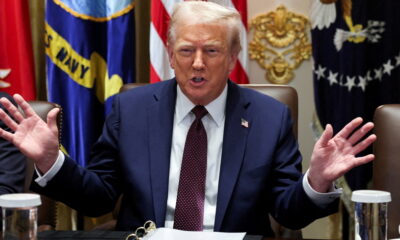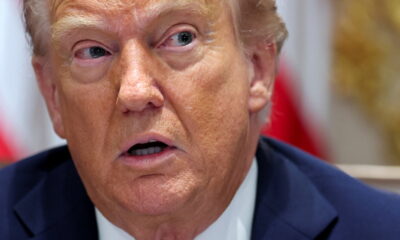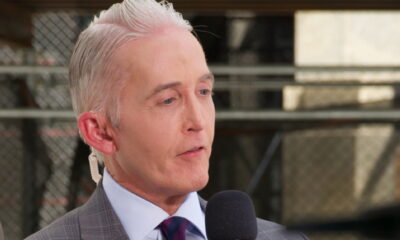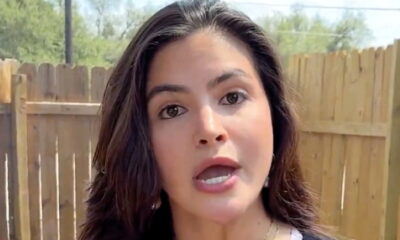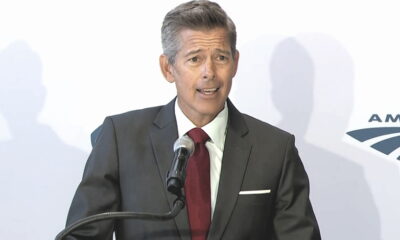Obama Includes Gays In Speech To UN On Palestinian Statehood (Full Text)
President Obama this morning addressed the United Nations on Palestinian statehood, and discussed the importance of supporting human and civil rights for gays and lesbians, and for the human, economic, and civil rights for women as well.
“No country should deny people their rights because of who they love, which is why we must stand up for the rights of gays and lesbians everywhere,” President Obama said. “And no country can realize its potential if half its population cannot reach theirs. This week, the United States signed a new Declaration on Women’s Participation. Next year, we should each announce the steps we are taking to break down economic and political barriers that stand in the way of women and girls. That is what our commitment to human progress demands.”
Here is the complete text of Obama’s speech, as prepared for delivery.
Â
THE WHITE HOUSE
Office of the Press Secretary
Â
September 21, 2011
Â
Remarks of President Barack Obama – As Prepared for Delivery
Address to the United Nations General Assembly
New York City
September 21, 2011
Â
As Prepared for Delivery –
Â
Mr. President, Mr. Secretary-General, fellow delegates, ladies and gentlemen: I would like to talk to you about a subject that is at the heart of the United Nations – the pursuit of peace in an imperfect world.
Â
War and conflict have been with us since the beginning of civilization. But in the first part of the 20th century, the advance of modern weaponry led to death on a staggering scale. It was this killing that compelled the founders of this body to build an institution that was focused not just on ending one war, but on averting others; a union of sovereign states that would seek to prevent conflict, while also addressing its causes.
No American did more to pursue this objective than President Franklin Roosevelt. He knew that a victory in war was not enough. As he said at one of the very first meetings on the founding of the United Nations, “We have got to make, not merely a peace, but a peace that will last.â€
Â
The men and women who built this institution understood that peace is more than the absence of war. A lasting peace – for nations and individuals – depends upon a sense of justice and opportunity; of dignity and freedom. It depends upon struggle and sacrifice; on compromise, and a sense of common humanity.
Â
One delegate to the San Francisco Conference that led to the creation of United Nations put it well – “Many people,†she said, “have talked as if all we had to do to get peace was…to say loudly and frequently that we loved peace and hated war. Now we have learned that no matter how much we love peace and hate war, we cannot avoid having war brought upon us if there are convulsions in other parts of the world.â€
Â
The fact is, peace is hard, but our people demand it. Over nearly seven decades, even as the United Nations helped avert a third World War, we still live in a world scarred by conflict and plagued by poverty. Even as we proclaim our love for peace and hatred of war, there are convulsions in our world that endanger us all.
Â
I took office at a time of two wars for the United States. Moreover, the violent extremists who drew us into war in the first place – Osama bin Laden, and his al Qaeda organization – remained at large. Today, we have set a new direction.
Â
At the end of this year, America’s military operation in Iraq will be over. We will have a normal relationship with a sovereign nation that is a member of the community of nations. That equal partnership will be strengthened by our support for Iraq – for its government and Security Forces; for its people and their aspirations.
Â
As we end the war in Iraq, the United States and our coalition partners have begun a transition in Afghanistan. Between now and 2014, an increasingly capable Afghan government and Security Forces will step forward to take responsibility for the future of their country. As they do, we are drawing down our own forces, while building an enduring partnership with the Afghan people.
Â
So let there be no doubt: the tide of war is receding. When I took office, roughly 180,000 Americans were serving in Iraq and Afghanistan. By the end of this year, that number will be cut in half, and it will continue to decline. This is critical to the sovereignty of Iraq and Afghanistan, and to the strength of the United States as we build our nation at home.
Â
Moreover, we are poised to end these wars from a position of strength. Ten years ago, there was an open wound of twisted steel and broken hearts in this city. Today, as a new tower rising at Ground Zero symbolizes New York’s renewal, al Qaeda is under more pressure than ever before. Its leadership has been degraded. And Osama bin Laden, a man who murdered thousands of people from dozens of countries, will never endanger the peace of the world again.
Â
Yes, this has been a difficult decade. But today, we stand at a crossroads of history with the chance to move decisively in the direction of peace. To do so, we must return to the wisdom of those who created this institution. The UN’s Founding Charter calls upon us, “to unite our strength to maintain international peace and security.†And Article 1 of this General Assembly’s Universal Declaration of Human Rights reminds us that, “All human beings are born free and equal in dignity and rights.’ Those bedrock beliefs – in the responsibility of states, and the rights of men and women – must be our guide.
Â
In that effort, we have reason to hope. This year has been a time of transformation. More nations have stepped forward to maintain international peace and security. And more individuals are claiming their universal right to live in freedom and dignity.
Â
One year ago, when we met here in New York, the prospect of a successful referendum in South Sudan was in doubt. But the international community overcame old divisions to support the agreement that had been negotiated to give South Sudan self-determination. And last summer, as a new flag went up in Juba, former soldiers laid down their arms; men and women wept with joy; and children finally knew the promise of looking to a future that they will shape.
Â
One year ago, the people of Cote D’Ivoire approached a landmark election. And when the incumbent lost, and refused to respect the results, the world refused to look the other way. UN peacekeepers were harassed, but did not leave their posts. The Security Council, led by the United States, Nigeria, and France, came together to support the will of the people. And Cote D’Ivoire is now governed by the man who was elected to lead.
Â
One year ago, the hopes of the people of Tunisia were suppressed. But they chose the dignity of peaceful protest over the rule of an iron fist. A vendor lit a spark that took his own life, but ignited a movement. In the face of a crackdown, students spelled out the word freedom. The balance of fear shifted from the ruler to those that he ruled. Now the people of Tunisia are preparing for elections that will move them one step closer to the democracy they deserve.
Â
One year ago, Egypt had known one President for nearly thirty years. But for 18 days, the eyes of the world were on Tahrir Square, where Egyptians from all walks of life – men and women; young and old; Muslim and Christian – demanded their universal rights. We saw in those protesters the moral force of non-violence that has lit the world from Delhi to Warsaw; from Selma to South Africa – and we knew that change had come to Egypt and to the Arab World.
Â
One year ago, the people of Libya were ruled by the world’s longest serving dictator. But faced with bullets and bombs and a dictator who threatened to hunt them down like rats, they showed relentless bravery. We will never forget the words of the Libyan who stood up in those early days of revolution and said, “Our words are free now. It’s a feeling you can’t explain.â€
Â
Day after day, in the face of bullets and bombs, the Libyan people refused to give back that freedom. And when they were threatened by the kind of mass atrocity that often went unchallenged in the last century, the United Nations lived up to its charter. The Security Council authorized all necessary measures to prevent a massacre. The Arab League called for this effort, and Arab nations joined a NATO-led coalition that halted Qadhafi’s forces in their tracks.
Â
In the months that followed, the will of the coalition proved unbreakable, and the will of the Libyan people could not be denied. Forty-two years of tyranny was ended in six months. From Tripoli to Misratah to Benghazi – today, Libya is free. Yesterday, the leaders of a new Libya took their rightful place beside us, and this week, the United States is reopening our Embassy in Tripoli. This is how the international community is supposed to work – nations standing together for the sake of peace and security; individuals claiming their rights. Now, all of us have a responsibility to support the new Libyan government as they confront the challenge of turning this moment of promise into a just and lasting peace for all Libyans.
Â
So it has been a remarkable year. The Qadhafi regime is over. Gbagbo, Ben Ali, and Mubarak are no longer in power. Osama bin Laden is gone, and the idea that change could only come through violence has been buried with him. Something is happening in our world. The way things have been is not the way they will be. The humiliating grip of corruption and tyranny is being pried open. Technology is putting power in the hands of the people. The youth are delivering a powerful rebuke to dictatorship, and rejecting the lie that some races, religions and ethnicities do not desire democracy. The promise written down on paper – “all human beings are born free and equal in dignity and rights†– is closer at hand.
Â
But let us remember: peace is hard. Progress can be reversed. Prosperity comes slowly. Societies can split apart. The measure of our success must be whether people can live in sustained freedom, dignity, and security. And the United Nations and its member states must do their part to support those basic aspirations.
Â
In Iran, we have seen a government that refuses to recognize the rights of its own people. And as we meet here today, men, women and children are being tortured, detained and murdered by the Syrian regime. Thousands have been killed, many during the holy time of Ramadan. Thousands more have poured across Syria’s borders. The Syrian people have shown dignity and courage in their pursuit of justice – protesting peacefully, standing silently in the streets, dying for the same values that this institution is supposed to stand for. The question for us is clear: Will we stand with the Syrian people, or with their oppressors?
Â
Already, the United States has imposed strong sanctions on Syria’s leaders. We have supported a transfer of power that is responsive to the Syrian people. Many of our allies have joined us in this effort. But for the sake of Syria – and the peace and security of the world – we must speak with one voice. There is no excuse for inaction. Now is the time for the United Nations Security Council to sanction the Syrian regime, and to stand with the Syrian people.
Â
Throughout the region, we will have to respond to the calls for change. In Yemen, men, women and children gather by the thousands in towns and city squares every day with the hope that their determination and spilled blood will prevail over a corrupt system. America supports their aspirations. We must work with Yemen’s neighbors and our partners around the world to seek a path that allows for a peaceful transition of power from President Saleh, and a movement to free and fair elections as soon as possible.
Â
In Bahrain, steps have been taken toward reform and accountability, but more are required. America is a close friend of Bahrain, and we will continue to call on the government and the main opposition bloc – the Wifaq – to pursue a meaningful dialogue that brings peaceful change that is responsive to the people. And we believe the patriotism that binds Bahrainis together must be more powerful than the sectarian forces that would tear them apart.
Â
Each nation must chart its own course to fulfill the aspirations of its people, and America does not expect to agree with every party or person who expresses themselves politically. But we will always stand up for the universal rights that were embraced by this Assembly. Those rights depend upon elections that are free and fair; governance that is transparent and accountable; respect for the rights of women and minorities; and justice that is equal and fair. That is what our people deserve. Those are elements of a peace that lasts.
Â
Moreover, the United States will continue to support those nations that transition to democracy – with greater trade and investment, so that freedom is followed by opportunity. We will pursue a deeper engagement with governments, but also civil society – students and entrepreneurs; political parties and the press. We have banned those who abuse human rights from travelling to our country, and sanctioned those who trample on human rights abroad. And we will always serve as a voice for those who have been silenced.
Â
Now I know that for many in this hall, one issue stands as a test for these principles – and for American foreign policy: the conflict between the Israelis and Palestinians.
Â
One year ago, I stood at this podium and called for an independent Palestine. I believed then – and I believe now – that the Palestinian people deserve a state of their own. But what I also said is that genuine peace can only be realized between Israelis and Palestinians themselves. One year later, despite extensive efforts by America and others, the parties have not bridged their differences. Faced with this stalemate, I put forward a new basis for negotiations in May. That basis is clear, and well known to all of us here. Israelis must know that any agreement provides assurances for their security. Palestinians deserve to know the territorial basis of their state.
Â
I know that many are frustrated by the lack of progress. So am I. But the question isn’t the goal we seek – the question is how to reach it. And I am convinced that there is no short cut to the end of a conflict that has endured for decades. Peace will not come through statements and resolutions at the UN – if it were that easy, it would have been accomplished by now. Ultimately, it is Israelis and Palestinians who must live side by side. Ultimately, it is Israelis and Palestinians – not us – who must reach agreement on the issues that divide them: on borders and security; on refugees and Jerusalem.
Â
Peace depends upon compromise among peoples who must live together long after our speeches are over, and our votes have been counted. That is the lesson of Northern Ireland, where ancient antagonists bridged their differences. That is the lesson of Sudan, where a negotiated settlement led to an independent state. And that is the path to a Palestinian state.
Â
We seek a future where Palestinians live in a sovereign state of their own, with no limit to what they can achieve. There is no question that the Palestinians have seen that vision delayed for too long. And it is precisely because we believe so strongly in the aspirations of the Palestinian people that America has invested so much time and effort in the building of a Palestinian state, and the negotiations that can achieve one.
Â
America’s commitment to Israel’s security is unshakeable, and our friendship with Israel is deep and enduring. And so we believe that any lasting peace must acknowledge the very real security concerns that Israel faces every single day. Let’s be honest: Israel is surrounded by neighbors that have waged repeated wars against it. Israel’s citizens have been killed by rockets fired at their houses and suicide bombs on their buses. Israel’s children come of age knowing that throughout the region, other children are taught to hate them. Israel, a small country of less than eight million people, looks out at a world where leaders of much larger nations threaten to wipe it off of the map. The Jewish people carry the burden of centuries of exile, persecution, and the fresh memory of knowing that six million people were killed simply because of who they were.
Â
These facts cannot be denied. The Jewish people have forged a successful state in their historic homeland. Israel deserves recognition. It deserves normal relations with its neighbors. And friends of the Palestinians do them no favors by ignoring this truth, just as friends of Israel must recognize the need to pursue a two state solution with a secure Israel next to an independent Palestine.
Â
That truth – that each side has legitimate aspirations – is what makes peace so hard. And the deadlock will only be broken when each side learns to stand in each other’s shoes. That’s what we should be encouraging. This body – founded, as it was, out of the ashes of war and genocide; dedicated, as it is, to the dignity of every person – must recognize the reality that is lived by both the Palestinians and the Israelis. The measure of our actions must always be whether they advance the right of Israeli and Palestinian children to live in peace and security, with dignity and opportunity. We will only succeed in that effort if we can encourage the parties to sit down together, to listen to each other, and to understand each other’s hopes and fears. That is the project to which America is committed. And that is what the United Nations should be focused on in the weeks and months to come.
Â
Now, even as we confront these challenges of conflict and revolution, we must also recognize once more that peace is not just the absence of war. True peace depends upon creating the opportunity that makes life worth living. And to do that, we must confront the common enemies of human beings: nuclear weapons and poverty; ignorance and disease. These forces corrode the possibility of lasting peace, and together we are called upon to confront them.
Â
To lift the specter of mass destruction, we must come together to pursue the peace and security of a world without nuclear weapons. Over the last two years, we have begun to walk down that path. Since our Nuclear Security Summit in Washington, nearly 50 nations have taken steps to secure nuclear materials from terrorists and smugglers. Next March, a Summit in Seoul will advance our efforts to lock down all of them. The New START Treaty between the United States and Russia will cut our deployed arsenals to the lowest level in a half century, and our nations are pursuing talks on how to achieve deeper reductions. America will continue to work for a ban on the testing of nuclear weapons, and the production of fissile material needed to make them.
Â
As we meet our obligations, we have strengthened the treaties and institutions that help stop the spread of these weapons. To do so, we must continue to hold accountable those nations that flout them. The Iranian government cannot demonstrate that its program is peaceful, has not met its obligations, and rejected offers that would provide it with peaceful nuclear power. North Korea has yet to take concrete steps toward abandoning its weapons, and continues belligerent actions against the South. There is a future of greater opportunity for the people of these nations if their governments meet their obligations. But if they continue down a path that is outside international law, they must be met with greater pressure and isolation. That is what our commitment to peace demands.
Â
To bring prosperity to our people, we must promote the growth that creates opportunity. In this effort, let us not forget that we have made enormous progress over the last several decades. Closed societies gave way to open markets. Innovation and entrepreneurship has transformed the way we live and the things that we can do. Emerging economies from Asia to the Americas have lifted hundreds of millions from poverty. Yet three years ago, we confronted the worst financial crisis in eight decades. That crisis proved a fact that has become clearer with each passing year – our fate is interconnected; in a global economy, nations will rise, or fall, together.
Â
Today, we confront the challenges that have followed that crisis. Recovery is fragile. Markets are volatile. Too many people are out of work. Too many others are struggling to get by. We acted together to avert a Depression in 2009. We must take urgent and coordinated action once more. Here in the United States, I have announced a plan to put Americans back to work and jumpstart our economy, and committed to substantially reduce our deficit over time. We stand with our European allies as they reshape their institutions and address their own fiscal challenge. For other countries, leaders face a different challenge as they shift their economies towards more self-reliance, boosting domestic demand while slowing inflation. Â So we will work with emerging economies that have rebounded strongly, so that rising standards of living create new markets that promote global growth. That is what our commitment to prosperity demands.
Â
To combat the poverty that punishes our children, we must act on the belief that freedom from want is a basic human right. The United States has made it a focus of our engagement abroad to help people to feed themselves. And today, as drought and conflict have brought famine to the Horn of Africa, our conscience calls on us to act. Together, we must continue to provide assistance, and support organizations that can reach those in need. And together, we must insist on unrestricted humanitarian access so that we can save the lives of thousands of men, women and children. Our common humanity is at stake. Let us show that the life of a child in Somalia is as precious as any other. That is what our commitment to our fellow human beings demands.
Â
To stop disease that spreads across borders, we must strengthen our systems of public health. We will continue the fight against HIV/AIDS, tuberculosis and malaria. We will focus on the health of mothers and children. And we must come together to prevent, detect, and fight every kind of biological danger – whether it is a pandemic like H1N1, a terrorist threat, or a treatable disease. This week, America signed an agreement with the World Health Organization to affirm our commitment to meet this challenge. Today, I urge all nations to join us in meeting the WHO’s goal of making sure all nations have core capacities to address public health emergencies in place by 2012. That is what our commitment to the health of our people demands.
Â
To preserve our planet, we must not put off the action that a changing climate demands. We must tap the power of science to save those resources that are scarce. Together, we must continue our work to build on the progress made in Copenhagen and Cancun, so that all of the major economies here today follow through on the commitments that were made. Together, we must work to transform the energy that powers are economies, and support others as they move down that path. That is what our commitment to the next generation demands.
Â
And to make sure our societies reach their potential, we must allow our citizens to reach theirs. No country can afford the cancer of corruption. Together, we must harness the power of open societies and open economies. That is why we have partnered with countries from across the globe to launch a new partnership on Open Government that helps ensure accountability and empower their citizens. No country should deny people their rights because of who they love, which is why we must stand up for the rights of gays and lesbians everywhere. And no country can realize its potential if half its population cannot reach theirs. This week, the United States signed a new Declaration on Women’s Participation. Next year, we should each announce the steps we are taking to break down economic and political barriers that stand in the way of women and girls. That is what our commitment to human progress demands.
Â
I know that there is no straight line to progress, no single path to success. We come from different cultures, and carry with us different histories. But let us never forget that even as we gather here as heads of different governments, we represent citizens who share the same basic aspirations – to live with dignity and freedom; to get an education and pursue opportunity; to love our families and our God. To live in the kind of peace that makes life worth living.
Â
It is the nature of our imperfect world that we are forced to learn this lesson over and over again. Conflict and repression will endure so long as some people refuse to do unto others as we would have them do unto us. Yet that is precisely why we have built institutions like this that bind our fates together – because those who came before us believed that peace is preferable to war; freedom is preferable to suppression; and prosperity is preferable to poverty. That is the message that comes not from capitals, but from citizens.
Â
When the corner-stone of this very building was put in place, President Truman came here to New York and said, “The United Nations is essentially an expression of the moral nature of man’s aspirations.†As we live in a world that is changing at a breathtaking pace, that is a lesson that we must never forget.
Â
Peace is hard, but we know that it is possible. Together, let us resolve to see that it is defined by our hopes and not our fears. Together, let us work to make, not merely a peace, but a peace that will last. Thank you.

Enjoy this piece?
… then let us make a small request. The New Civil Rights Movement depends on readers like you to meet our ongoing expenses and continue producing quality progressive journalism. Three Silicon Valley giants consume 70 percent of all online advertising dollars, so we need your help to continue doing what we do.
NCRM is independent. You won’t find mainstream media bias here. From unflinching coverage of religious extremism, to spotlighting efforts to roll back our rights, NCRM continues to speak truth to power. America needs independent voices like NCRM to be sure no one is forgotten.
Every reader contribution, whatever the amount, makes a tremendous difference. Help ensure NCRM remains independent long into the future. Support progressive journalism with a one-time contribution to NCRM, or click here to become a subscriber. Thank you. Click here to donate by check.
 |








